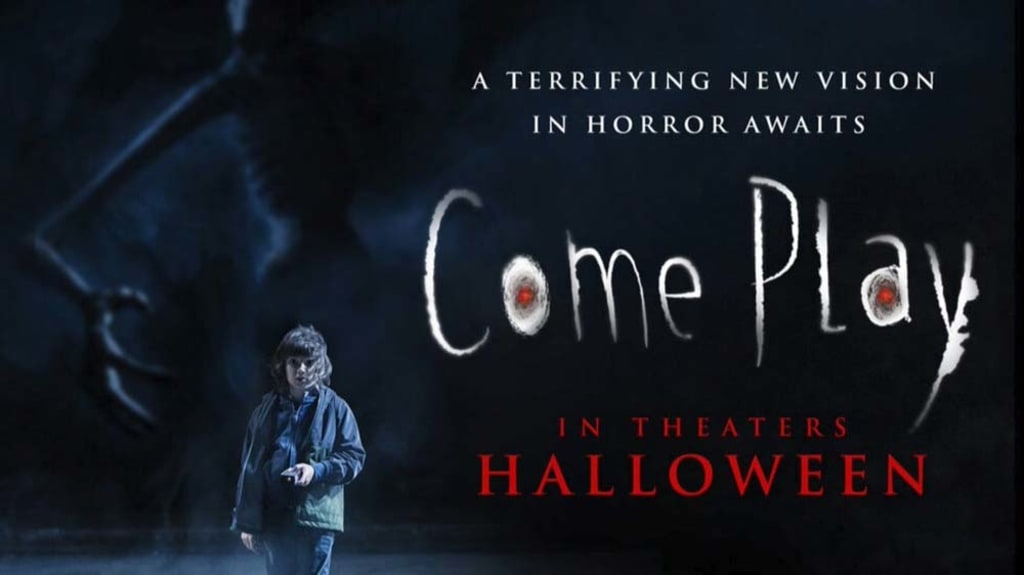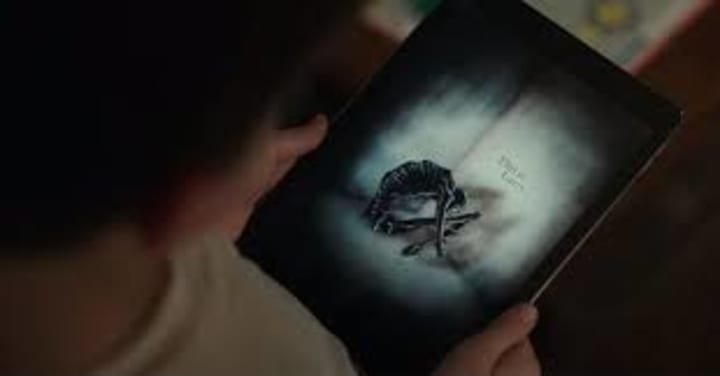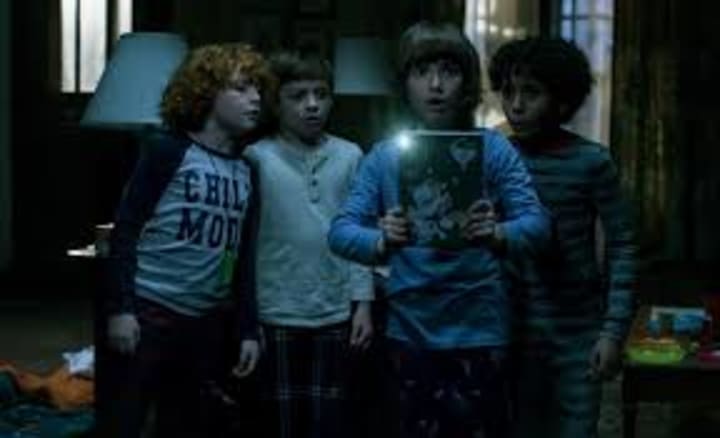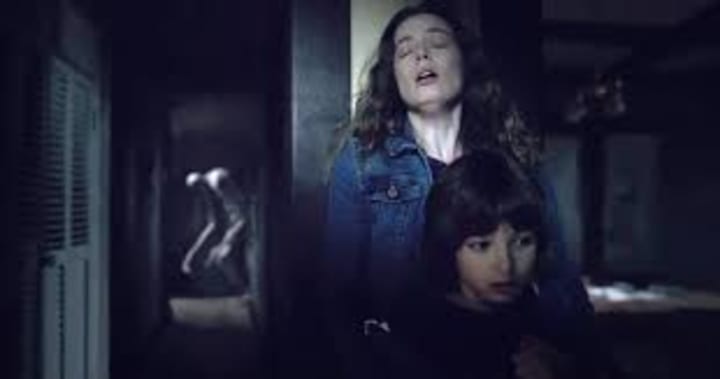"Come Play" review by an actually autistic person
Does this movie get the Autistic Stamp of Approval?

WARNING! MILD SPOILERS AHEAD!
I'm autistic and I absolutely love horror movies. Ever since my dad made the mistake of showing me Frankenstein at the age of eight, I've been obsessed with the genre. I don't have a favorite sub-genre, so I'm down for anything. Earlier this week, I showed my autistic friend (let's just call him Bud) a trailer for a horror movie called Come Play, and he asked if I was willing to drive forty minutes to his hometown to watch it. The last movie I saw in theatres was Birds of Prey back in February, so it was worth the forty minute drive just to sit in front of the big screen again.
Come Play focuses on Oliver, a non-verbal autistic boy, and Larry, a monster from a children’s story. Like any other autistic child, Olivier has a hard time making friends. After reading bits from a story he found on his phone, he accidentally welcomes Larry into his life and must avoid getting caught by his “new friend”. Not only does the movie attempt to display what it’s like being autistic, but it also attempts to show the different ways a neurotypical (non-autistic person) might react to autistic characteristics.

I always get a little anxious when I hear that an upcoming movie or series has an autistic character because Autism has been woefully misrepresented over the years. Even when it is accurate, it’s almost always the same darn thing: a couple isn’t sure what to do with their white autistic boy, who just doesn’t know how to make friends or have conversations. Yes, it’s realistic, but I’ve seen it before. Unsurprisingly, this movie has the same plot. Surprisingly, though, it’s not as bad as I thought it would be.
I'm gonna be honest and say that this movie is a bit of a mess. Before I went to the theatre, I briefly read this one review that described this movie as "if Steven Spielberg directed the Babadook". It pretty much shows us the same crap that we've seen in other horror movies and doesn't really offer anything new. There are also some plot points that could've been more clearer. Bud said to me, "This is a good horror movie for kids who want something that's a step up from Goosebumps." It's definetly not the scariest thing seen in theatres since Hereditary, but it's harmless. However, it seems that most critics can agree that the lack of scares and originality is made up for with the main cast's performances and the realistic family drama. Bud and I really enjoyed the accurate portrayal of Autism, and we got excited whenever we show or heard something relatable to autistic people like us. I read an article by Insider that director Jacob Chase actually showed his script to an autistic boy who was once non-verbal for approval, and he made sure that his star Azhy Robertson spent a lot of time with autistic kids and their families and therapists in order to prepare for the role. He certainly made Bud and me proud.

Right off the bat, Bud and I were impressed by the sound design. Whenever Larry took a step closer or did anything to announce his presence, the sound grew more and more heart-pounding. As autistics, our five senses are more intense than the senses of neurotypicals. Our senses of touch, taste, sight, smell, and hearing can be so intensified to the point that it’s unbearable and could lead to sensory overload. However, you should keep in mind that not all autistics are the same and not all of our senses are going to be on the same level of intensity. For example, my most sensitive sense is my sense of hearing, and my least sensitive sense is my sense of sight. With that being said, those loud effects were a bit too real for me. Sensory overload, as aforementioned, is when an autistic person is overstimulated by their surroundings to the point that they have a meltdown. It can also be caused by a change in their routine. At one point during the movie, the mother takes Oliver out of class and states that she understands that this is "not part of his routine".
The most common way for an autistic person to calm down during or after a meltdown is to stim. "Stimming" is a self-stimulating behavior that usually involves repetitive movements or sounds. As we viewed the film, Bud noted that the word "stimming" and its definition were mentioned more explicitly than it normally is in movies and tv shows. The use of stimming is displayed during some of the movie's more tense scenes, and the presence of Larry could be seen as a metaphor for sensory overload. After all, it can happen when you least expect it, and you're not always sure what to do when it occurs. Some of Oliver's forms of stimming include spinning around in a circle (a very common form), rubbing his knuckles together, and humming the SpongeBob Squarepants theme song.
Although the term is never mentioned once in the film, "special interest" is highly represented. An autistic person's special interest is something that they admire and obsess over. For instance, my special interests include musicals, fairy tales, and, of course, horror movies. I could talk about my favorite horror movies all day, and I would love to make one someday. In this movie, Oliver's special interest is clearly SpongeBob. We know this right off the bat when the movie opens with our protagonist watching the iconic series, trying his hardest to drown out his parents' squabbling in the background. Watching the show makes him happy, and he even tries to help out a traumatized classmate by showing him an episode and finally getting him to speak. We later see them watching an episode together after they set their differences aside, showing how a special interest could really bring people together.
According to the Insider article that I've mentioned before, having SpongeBob as a special interest wasn't a random thing that was tossed into the script. Director Jacob Chase explained that he saw a lot of the iconic sponge in Oliver as they are both well-meaning individuals who see the best in other people. It turns out that the iconic kids' show is very popular in the autistic community, and I just so happen to be one of the show's many autistic fans. SpongeBob had always made me so happy as a child, and I related too much to the sponge who just wants to do what's right. He doesn't always understand what's going on, but his heart is in the right place. Most autistic people can relate to the sponge who lives in a pineapple under the sea, and I'm glad that he was Oliver's special interest.
As I mentioned earlier, I've seen this kind of story before. Most stories about autism focus more on the parents and peers of the child rather than the child. Although this film does show a bit more from an autistic point of view, it still puts a spotlight on the neurotypicals, particularly the mother. Being the parent of an autistic child isn't an easy job, and Gillian Jacobs does a fantasic job in her portrayal of Sarah. She doesn't fully understand Oliver's tendencies, but she learns along the way and will do anything to keep her son safe. Throughout the film, she learns that she needs to stop focusing so much on what she wants out of her child and more on what her child needs out of her. John Gallanger Jr., who's been making a name for himself as a scream king thanks to movies like Hush and 10 Cloverfield Lane, does a pretty good job as Oliver's dad Marty. Marty doesn't seem to be as involved with his autistic child as Sarah is, and their disagreements over what to do with their son causes a strain in their relationship. Like Sarah, Marty learns more about parenting along the way and is also willing to do anything to keep Oliver safe.
While I will give this movie credit for its accuracy, I wish it had been more original. There are soooooo many movies and shows that focus on autistic white boys, and they're almost all the same. Hollywood needs to take a page from the series Everything's Gonna Be Okay and show some diversity. Not only does the show include an autistic girl as one of its characters, but she just so happens to be played by an actually autistic actress. Although Azhy Robertson's performance comes across as authentic, we really need to encourage more autistic people to pursue acting so that they can have the chance to play autistic roles. We also need more stories about autistic adults, and we could use more diverse depictions. Rarely do we get to see an autistic character who's female, black, gay, or trans. Until we get more diverse stories, I think we should take a break from stories about little autistic white boys. Despite the lack of diversity, this movie gets my Autistic Stamp of Approval, and I shall award it three and a half stars.

Torres, Libby. “The Director of 'Come Play' Centers a Boy with Autism in His New Horror Film, but Says It's Not a Movie 'about' the Disorder.” Insider, Insider, 29 Oct. 2020, www.insider.com/come-play-jacob-chase-autism-2020-10.
About the Creator
Catherine Burford
I'm just your everyday Autistic Artist.






Comments
There are no comments for this story
Be the first to respond and start the conversation.